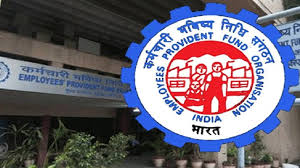The minimum monthly pension of Rs 1,000 for subscribers of the pension scheme run by retirement fund body EPFO is “grossly inadequate” and it is imperative for the labour ministry to pursue a proposal for raising the amount, a Parliamentary panel said on Tuesday.
The minimum monthly pension of Rs 1,000 for subscribers of the pension scheme run by retirement fund body EPFO is “grossly inadequate” and it is imperative for the labour ministry to pursue a proposal for raising the amount, a Parliamentary panel said on Tuesday.
“…Rs 1000 per month pension which was fixed eight years back appears to be grossly inadequate now”, the Parliamentary Standing Committee on Labour stated in its 30th report on Demand for Grants 2022-23, tabled in Parliament.
Read More:-EPFO fixes interest rates at 8.1%: Here’s a look at the EPF interest rates in the last few years
The panel said it becomes imperative on the part of the Ministry of Labour and Employment to pursue the matter with the Ministry of Finance for obtaining adequate budgetary support as recommended by the High-Empowered Monitoring Committee, besides impressing upon the EPFO (Employees’ Provident Fund Organisation) to make an actuarial assessment of all its pension schemes so that the monthly member pension is enhanced to a reasonable extent.
It noted that in 2018, the ministry constituted a High-Empowered Monitoring Committee for complete evaluation and review of the Employees Pension Scheme, 1995.
That committee in its report had inter-alia recommended that minimum monthly pension payable to the member/widow/widower pensioner may be raised to at least Rs 2,000, provided annual budgetary provision for the same is made, it stated.
However, it also noted that the Ministry of Finance has not agreed to any such enhancement in minimum pension beyond Rs 1,000 per month.
The parliamentary panel found that the issue has been discussed in detail by several committees which have come to the conclusion that unless the actuarial assessment of surplus/deficit of EPFO’s pension schemes is made, revision of the monthly pension cannot be done.
It also said difficulties are being faced by EPFO members for e-nomination, especially by those who retired before 2015, as well as in the functioning of the Online Transfer Claim Portal (OTCP).
While taking note of the appreciable efforts made by the EPFO to maximise use of information and technology tools in line with Digital India initiative, the panel suggested that the retirement fund body should strive further to usher in systemic improvements to address the problems faced in e-nomination.
The panel also noted that out of the target of 71.80 lakh beneficiaries by March 31, 2022 under the Atmanirbhar Bharat Rojgar Yojana (ABRY), a total of 47.06 lakh employees have benefited as on February 6, 2022.
As on the same date, 5.42 lakh employees who made exit from employment during March 1, 2020 to September 30, 2020 and joined any EPF registered establishment between October 1, 2020 to March 31, 2022 have availed the benefits under the scheme.
Further, as on February 14, 2022, a total of 1,29,672 establishments have availed benefits in respect of 48,95,597 employees after fulfilling requirements under ABRY.
With a view to covering all the 71.80 lakh targeted beneficiaries by March 31, 2022, the ministry is taking a number of steps.
The panel also said the eligibility conditions specified for availing the benefits under the ABRY need to be revisited and streamlined as a number of employers/ employees are deprived of the benefits due to lack of awareness as well as complexities involved.
It recommended that the ministry should look into these issues with a sense of urgency and priority, especially according a focussed approach towards strengthening the awareness programmes so that the very purpose of benefitting both employers and employees under ABRY is truly achieved.
In the backdrop of impact of pandemic, the panel suggested to the ministry to energise its resources with renewed vigour so as to offset the shortfalls experienced in optimal achievement of targets in some major schemes.
It noted that in case of a large number of major schemes, the ministry have not been able to achieve the targets during 2021-22.
Citing an example, it stated that the targets for new enrolments of working children in Special Training Centres (STCs) under the National Child Labour Project could be achieved only to the extent of 2,514 new enrolments against a target of 50,000 children.
Out of 40,000 children targeted to be mainstreamed to formal education system, only 5,534 could be enrolled.
As regards the Pradhan Mantri Shram Yogi MaanDhaan Yojana (PM-SYM), while the target fixed was 1 crore new enrolments, the beneficiaries enrolled has only been to the extent of 1,10,791 (as on December 2021).
Out of 100 Model Career Centres (MCCs) proposed to be operationalised, only 41 could be put into operation. Under labour welfare schemes, while the target for education was 4 lakh, the achievement was 1.11 lakh.
Similarly, it noted that for the National Pension Scheme for traders, shopkeepers and self-employed persons, the enrolments have been a miniscule 4,249 vis-a-vis the target of 25 lakh.





































